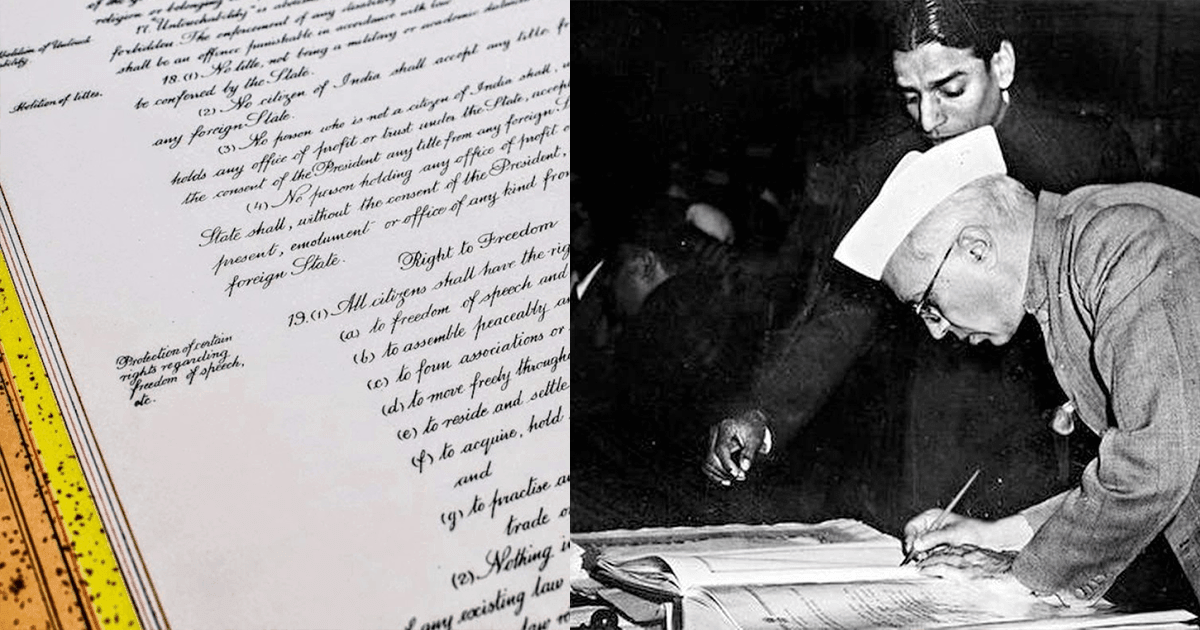After a long struggle for the freedom of India, the nationalists came up to the day of November 26, 1949, when the people resolved to unite India into the Sovereign Democratic Republic. To this day when we had our own laws that gave us the freedom that the nation longed for by adopting the most sacred & the supreme law of the nation- The Constitution Of India.
It took 2 years & 11 months to shape the document & over 100 amendments to date to suit our needs. Here are the most cherished facts for you on Constitution Day!
Dr. B.R. Ambedkar was ready to burn it
In order to protect the minorities of our country, he took a stand even ready to burn the Constitution if minorities are injured.
It was written in both Hindi and English
Every member of the Constituent Assembly signed both the English and Hindi drafts of the constitution.
There are 117,369 words in the English version
The Constitution contains 444 Articles in 22 parts, 12 schedules and 115 amendments.
The constitution was penned down by Prem Behari Narain Raizada
Both the Hindi and English versions of the Constitution were handwritten in Italic Calligraphy, the draft of which was published in Dehradun.
Each page is decorated
Every page of the Constitution was decorated by Beohar Rammanohar Sinha and Nandalal Bose and many more artists from the Shanti Niketan.
The original copies are stored in the Parliament
Both the English and Hindi versions are stored in Helium filled cases in the library.
It is the longest written Constitution ever
The Constitution of India is the longest written Constitution in the world.
India as Sovereign, Socialist, Secular, Democratic Republic
The constitution of India declares India as a Sovereign, Socialist, Secular Democratic Republic. It promotes fraternity and assures that its citizens have Justice, Equality, and Liberty.
9 December 1946, the first meeting!
The constituent Assembly gathered for the first time on 9 December 1946. Dr. Sachchidananda Sinha was the first temporary chairman.
3 years in the making
To be precise, it took 2 years 11 months and 18 days to draft it.
About 2,000 amendments were made while drafting
After the first draft, in the debate, 2,000 amendments were made.
The final draft came to life
The Constituent Assembly took 11 sessions to frame the constitution & the final draft was ready by 26 November 1949.
Each member of the Parliament signed the Constitution
The Constitution was signed by 284 members of the Constituent Assembly on 24 January 1950.
The National Emblem was adopted on 26 January 1950
The National Emblem was taken from the Ashokan Lion Capital at Sarnath with only 3 lions visible.
A bag of borrowings
The Constitution of India borrows a number of features from many other Constitutions in the world thus making it the longest written Consitution. The features were inspired not copied!
Based on a series of statues of British Parliament
The fundamental laws of India are mostly based on a series of statutes enacted by the British Parliament.
Adaptations from the French Constitutions
Liberty, Equality, and Fraternity these main ideals of the Indian Constitution are adopted from the French Constitution. A lot of other countries adopted the same ideals.
Adaptations from the Soviet Constitution
The five-year plans are adopted from the Union of Soviet Socialist Republics.
Adaptations from Japanese Constitution
The concept of “procedure established by Law” was adopted from the Japanese Constitution.
Adaptations from the Weimar Constitution of Germany
The idea of suspension of fundamental rights during Emergency was taken from the Weimar Constitution of Germany.
Constitution derives authority from “The People”
The Constitution of India derives all its power & authority from the people of India as stated in The Preamble Of India: “We The People”.
The unamendable basic structure
The basic structure of the Indian Constitution is affirmed by the Kesavananda Bharti vs. State of Kerela, 1971.
A Constitution that stood the test of time
Only 103 amendments have been made in the constitution since 1950.
The Republic was born
The Constitution was legally enforced on 26 January 1950 marking an end of the monarchy by declaring India to be a sovereign, socialist, secular, democratic republic.
Right To Property was a Fundamental Right
Right To Property under Article 31 was a Fundamental Right but was deleted by enacting 44th Amendment Act, 1978 to curb inequality.

